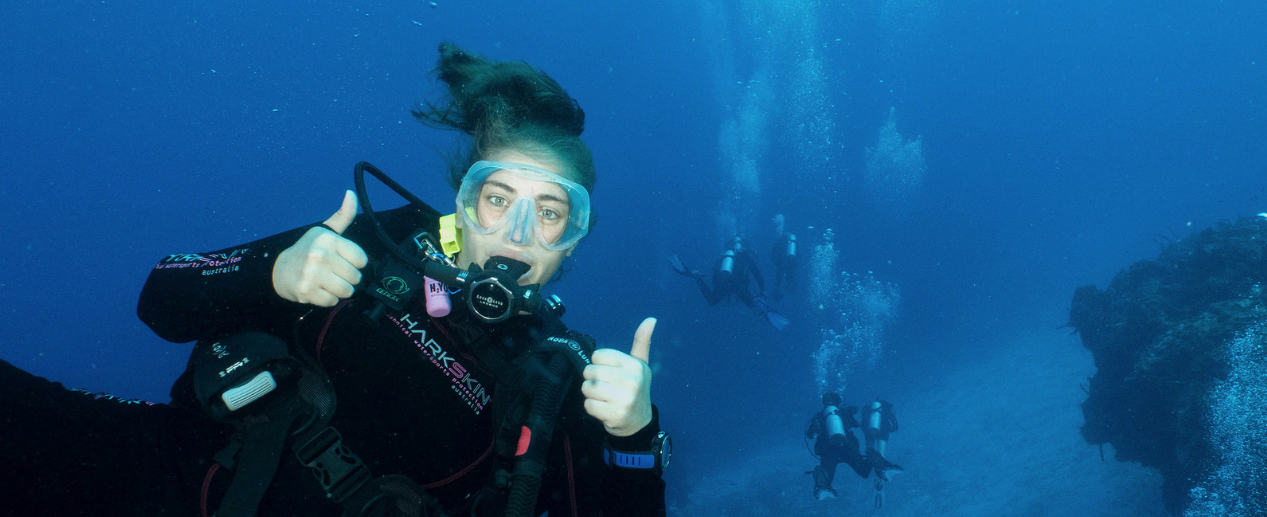Top Three Continuing Education Courses (And Why)
Ocean First Jul 01, 2022

Want to become a better diver? You can dive to your heart's content, but the key to growing as a diver lies in continuing your education. Scott Griesser, Ocean First's Training Director, breaks down the top three con-ed courses he recommends for every diver:
 I am often approached by new divers eager to grow their skills who, after seeing the wall of continuing education options, ask me "where should I begin?" While there is value in every con-ed course we offer, I always recommend these three to start: Nitrox, Perfect Buoyancy, and Marine Ecology.
I am often approached by new divers eager to grow their skills who, after seeing the wall of continuing education options, ask me "where should I begin?" While there is value in every con-ed course we offer, I always recommend these three to start: Nitrox, Perfect Buoyancy, and Marine Ecology.
Nitrox:
Enriched Air Nitrox, Nitrox or EAN for short, refers to any mixture of air in which oxygen is greater or equal to 22%. Atmospheric air consists of approximately 21% oxygen and 79% nitrogen. When the partial pressure of nitrogen is reduced by increasing the level of oxygen, we reduce the nitrogen uptake in the body's tissues.
The important thing to remember is that diving with EAN can increase your no-decompression limits, reduce the required length of your surface interval, and, most importantly, decrease the chances of decompression sickness.
If you find yourself on a dive trip with an aggressive profile, such as on a liveaboard with four to five dives per day, you will greatly benefit from diving on nitrox instead of regular air. For most Ocean First trips, we highly encourage our divers to gain this certification, and nitrox is often included in the trip cost. Another reason to take the Nitrox course - no pool time required, just a couple hours in the classroom!
Perfect Buoyancy:
 Tired of running out of air before your no-decompression time? The cause is usually improper breathing patterns, being overweighted, or overall poor buoyancy.
Tired of running out of air before your no-decompression time? The cause is usually improper breathing patterns, being overweighted, or overall poor buoyancy.
Controlling your buoyancy is one of the most important skills you can master. It improves your safety, reduces fatigue, enhances the enjoyment of diving, increases your dive times, and prevents you from accidentally damaging the underwater environment. With perfect buoyancy control, you can be the envy of your dive buddies.
New and experienced divers alike are often overconfident in their buoyancy skills without devoting any time to evaluate and refine their breathing patterns and weight choices, which in extreme cases can be fatal. "Diving incident reports often cite overweighting and/or poor buoyancy control as a...factor associated with accidents or near accidents. For example, in a study of 100 diving fatalities... 45 percent of the victims were believed to have been overweight." (Source: Divers Alert Network)
In the Perfect Buoyancy class, you will learn the principles of proper weighting and breathing patterns and will have the opportunity to devote time specifically to refining those skills in the pool. When you return to the open water, you will be able to notice the big effect that small adjustments can make.
Marine Ecology:
 While I specifically mention Marine Ecology, any of the SSI ecology classes are a great addition to your diving knowledge. We spend upwards of 30 hours learning the skills necessary to interact with the beauty that lies beneath the surface, so why not take a few more hours and understand the ecology of what we are looking at? Choose from Marine Ecology, Fish Identification, Coral Identification, Sea Turtle Ecology, Shark Ecology, and Manta & Ray Ecology (coming soon!).
While I specifically mention Marine Ecology, any of the SSI ecology classes are a great addition to your diving knowledge. We spend upwards of 30 hours learning the skills necessary to interact with the beauty that lies beneath the surface, so why not take a few more hours and understand the ecology of what we are looking at? Choose from Marine Ecology, Fish Identification, Coral Identification, Sea Turtle Ecology, Shark Ecology, and Manta & Ray Ecology (coming soon!).
Through the ecology programs, you will learn about the underwater relationships between living organisms, their physical environment, and the vital connections between plants and animals. Divers who take these courses are more likely to want to protect the ocean and its inhabitants, which couldn’t be more important at a time when the ocean is in great peril.
There's a whole world of knowledge out there, but by starting small with these three courses, you will be armed and ready to explore! Check out our calendar for upcoming classes or contact us to get a class on the books that will fit your schedule.
